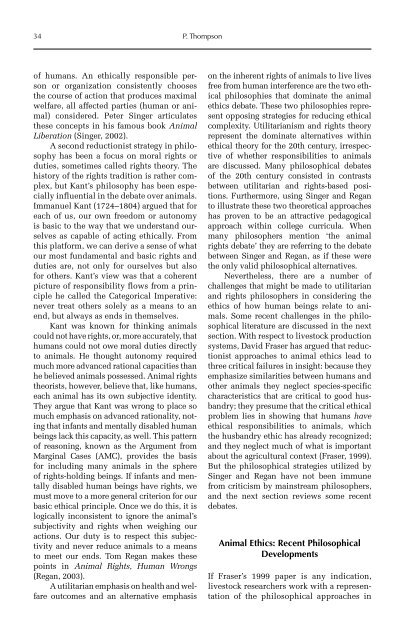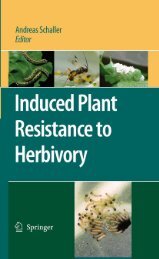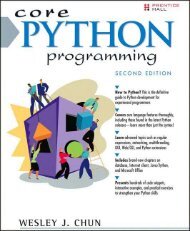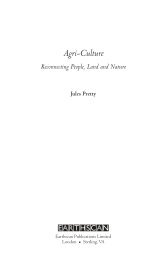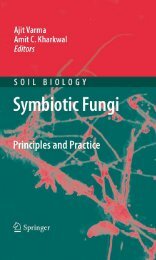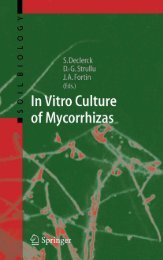Redesigning Animal Agriculture
Redesigning Animal Agriculture
Redesigning Animal Agriculture
Create successful ePaper yourself
Turn your PDF publications into a flip-book with our unique Google optimized e-Paper software.
34 P. Thompson<br />
of humans. An ethically responsible person<br />
or organization consistently chooses<br />
the course of action that produces maximal<br />
welfare, all affected parties (human or animal)<br />
considered. Peter Singer articulates<br />
these concepts in his famous book <strong>Animal</strong><br />
Liberation (Singer, 2002).<br />
A second reductionist strategy in philosophy<br />
has been a focus on moral rights or<br />
duties, sometimes called rights theory. The<br />
history of the rights tradition is rather complex,<br />
but Kant’s philosophy has been especially<br />
influential in the debate over animals.<br />
Immanuel Kant (1724–1804) argued that for<br />
each of us, our own freedom or autonomy<br />
is basic to the way that we understand ourselves<br />
as capable of acting ethically. From<br />
this platform, we can derive a sense of what<br />
our most fundamental and basic rights and<br />
duties are, not only for ourselves but also<br />
for others. Kant’s view was that a coherent<br />
picture of responsibility flows from a principle<br />
he called the Categorical Imperative:<br />
never treat others solely as a means to an<br />
end, but always as ends in themselves.<br />
Kant was known for thinking animals<br />
could not have rights, or, more accurately, that<br />
humans could not owe moral duties directly<br />
to animals. He thought autonomy required<br />
much more advanced rational capacities than<br />
he believed animals possessed. <strong>Animal</strong> rights<br />
theorists, however, believe that, like humans,<br />
each animal has its own subjective identity.<br />
They argue that Kant was wrong to place so<br />
much emphasis on advanced rationality, noting<br />
that infants and mentally disabled human<br />
beings lack this capacity, as well. This pattern<br />
of reasoning, known as the Argument from<br />
Marginal Cases (AMC), provides the basis<br />
for including many animals in the sphere<br />
of rights-holding beings. If infants and mentally<br />
disabled human beings have rights, we<br />
must move to a more general criterion for our<br />
basic ethical principle. Once we do this, it is<br />
logically inconsistent to ignore the animal’s<br />
subjectivity and rights when weighing our<br />
actions. Our duty is to respect this subjectivity<br />
and never reduce animals to a means<br />
to meet our ends. Tom Regan makes these<br />
points in <strong>Animal</strong> Rights, Human Wrongs<br />
(Regan, 2003).<br />
A utilitarian emphasis on health and welfare<br />
outcomes and an alternative emphasis<br />
on the inherent rights of animals to live lives<br />
free from human interference are the two ethical<br />
philosophies that dominate the animal<br />
ethics debate. These two philosophies represent<br />
opposing strategies for reducing ethical<br />
complexity. Utilitarianism and rights theory<br />
represent the dominate alternatives within<br />
ethical theory for the 20th century, irrespective<br />
of whether responsibilities to animals<br />
are discussed. Many philosophical debates<br />
of the 20th century consisted in contrasts<br />
between utilitarian and rights-based positions.<br />
Furthermore, using Singer and Regan<br />
to illustrate these two theoretical approaches<br />
has proven to be an attractive pedagogical<br />
approach within college curricula. When<br />
many philosophers mention ‘the animal<br />
rights debate’ they are referring to the debate<br />
between Singer and Regan, as if these were<br />
the only valid philosophical alternatives.<br />
Nevertheless, there are a number of<br />
challenges that might be made to utilitarian<br />
and rights philosophers in considering the<br />
ethics of how human beings relate to animals.<br />
Some recent challenges in the philosophical<br />
literature are discussed in the next<br />
section. With respect to livestock production<br />
systems, David Fraser has argued that reductionist<br />
approaches to animal ethics lead to<br />
three critical failures in insight: because they<br />
emphasize similarities between humans and<br />
other animals they neglect species-specific<br />
characteristics that are critical to good husbandry;<br />
they presume that the critical ethical<br />
problem lies in showing that humans have<br />
ethical responsibilities to animals, which<br />
the husbandry ethic has already recognized;<br />
and they neglect much of what is important<br />
about the agricultural context (Fraser, 1999).<br />
But the philosophical strategies utilized by<br />
Singer and Regan have not been immune<br />
from criticism by mainstream philosophers,<br />
and the next section reviews some recent<br />
debates.<br />
<strong>Animal</strong> Ethics: Recent Philosophical<br />
Developments<br />
If Fraser’s 1999 paper is any indication,<br />
livestock researchers work with a representation<br />
of the philosophical approaches in


